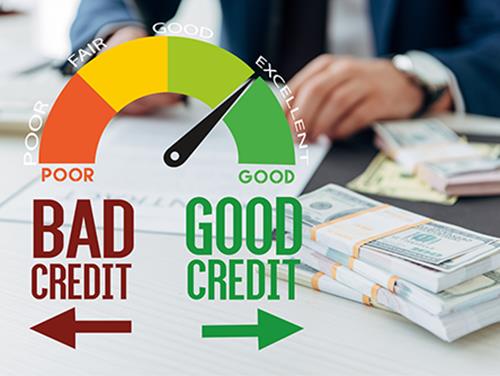Updated On:
October 8, 2021
• 8 Minute Read
Your credit rating, or how much of a risk it is to lend you money, is generally determined by your FICO score. This is a score that ranges from 300 to 850, and higher scores indicate a better credit rating and make it more likely that you will be able to obtain loans. To have any credit score at all, you'll need to have at least one credit account where a creditor reports on your activities to credit bureaus open for a minimum of six months. You can see your credit score for free here if you are unsure what your latest score is.

Why it's Important to Have Good Credit
Having a good credit rating is very important. Your credit rating is often what determines if you're able to get a creditor to loan you money, and it will also generally determine the terms of a loan. Better credit scores usually net you lower interest rates, lower or no down payments and larger credit lines.
However, there are also several aspects of your life that are affected by your credit rating that may surprise you. For instance, many employers are now doing background checks on prospective employees that include a credit check. A poor credit rating may lead an employer to assume you're not responsible.
Bad credit ratings can also make it difficult to rent an apartment, obtain affordable car insurance and get utilities in your name. Moreover, personal relationships can be made difficult if you're struggling to make ends meet or can't get a loan to buy a home because of a low credit score.
Building Your Credit Score if You're Starting Out
If you don't have a credit score or credit history, there are a variety of ways that you can build one. Some of these options may or may not be open to you depending on your age and income, but one or more of the options should be available to you. Additionally, so long as you're careful about it, there's no reason you shouldn't be able to use several of these methods to build a solid credit score.
- Apply for a Secured Credit Card
You may find it difficult to get approved for a credit card if you have no credit history. In these cases, your best bet may be to apply for a secured credit card. Secured credit cards work on the same basic principles as standard credit cards, but you have to put down a deposit to use one. Your deposit amount is your line of credit, and while you aren't necessarily being lent money by the credit card company, your on-time payments and use of your card build your credit score.
- Credit builder loans
Another option is to get a credit builder loan. The idea behind these loans is to help people build credit and not to give people access to funds. You'll need anywhere from $500 to $1,000 to obtain one of these loans, and your money will go into an interest-bearing savings account. Once you pay off the loan amount over a period of time, your credit score will increase and you'll get your money back at the end of the loan's term.
- Get an Unsecured Card with a Cosigner
One way that you can build credit is to piggyback on the good credit of another individual. This is most frequently done by having someone with good credit act as a co-signer on a credit card or a loan. However, if you default on a loan, the co-signer is responsible for paying it off. If you're able to get a credit card that's unsecured with the help of a co-signer, the individual will not end up losing whatever was used to secure a loan if it's not paid.
Good Practices for Maintaining Your Credit Rating
Once you've opened up credit accounts, it's important to stay on top of them and to engage in responsible credit card use. If you don't, you could end up damaging your credit rating. Ways to maintain and improve your credit rating include:
- Make regular and on-time payments
- Don't let your credit cards stay near their limit
- Avoid opening a large number of credit accounts
- Try to be aware of and avoid fees
- Don't go over your credit card's spending limit even if the charges will be covered

Improving Your Credit Score
Once you've established a credit history for yourself, you'll want to work on improving your credit rating. This will give you access to better credit cards and loan opportunities in the future.
- Getting Higher Credit Limits
Many credit card companies have a set amount of time that they will review your account for a credit line increase, and it's usually done annually. However, if you haven't had an increase after a year or your creditor doesn't do regular checks, you can always call a credit card company and request an increase in your credit line.
Each creditor may have their own system for determining if and how much of a credit line increase to give to a user. However, most use the same metrics, which are your payment history, if you've been able to keep your balance at around 30 percent of your limit or less and your current income.
- Using Rewards Cards
Rewards cards allow you to accrue benefits while you're using your credit card. One of the most popular uses of credit cards is to obtain frequent flier miles, but many credit card companies have also begun to offer perks like cash back rewards or discounts when you shop at particular businesses. Depending on the rewards program, it can make it cheaper to use your card than to pay with cash, and so long as you keep up with payments, your credit score will benefit.
Rebuilding a Damaged Credit Score
If you've got a bad credit rating, many of the methods covered in building a credit score from nothing will also work for you. However, it's important to be aware of what resulted in your poor credit rating in the first place so you don't make the same mistakes. In some cases, a bad credit score is due to occurrences beyond someone's control, such as the loss of a job or an unexpected illness. That said, there are many times that a bad credit score is due to someone's inability to manage money.
Paul Meeks, a Financial Expert from GOBankingRates says, "The most critical mistake that people, particularly young people, make is that they roll over credit card balances. Treat your credit card like a debit card and don't leave an unpaid balance at the end of the month. Students are charged an egregious 20%+ by the credit card issuers. Even those of us with longer financial histories and better credit ratings pay over 10%. Pay off your credit card now!"
Other mistakes people make are relying too much on credit cards to pay bills, living outside their means, or racking up a number of fees and a large amount of interest, which can make it very difficult to keep up with payments. Here are some tips to rebuilding a damaged credit score:
- Make Sure Payments are Made on Time
One of the most important parts of getting your credit score back on track is to ensure that you start paying your creditors off on time. Even if you're not able to pay more than the minimum required payment, doing so can still make a huge difference since about 35 percent of your credit score is based on your payment history. All it takes is one late payment to be reported for your score to start to slip again, so make it a priority to stay current on your accounts.
- Pay off Your Debts
Another significant factor in your credit rating is the amount of debt that you have. When calculating your credit rating, the amount of money you owe, how close your accounts are to their limit and how many accounts you have open with outstanding debt are all factored in. If you're not able to pay off your debts immediately, which is often not possible, try to limit the amount of debt that you add.
Other tips for boosting your credit rating include:
- Not opening and closing accounts in a short period of time
- Avoid applying for several credit cards or loans at once
- Try to pay off your outstanding debts before applying for another card
- Pay attention to your debt-to-income ratio

Maintaining and Monitoring Your Credit Score
Once you've built or rebuilt your credit score, it's important that you maintain it. It takes a fair amount of time and effort to get a good credit rating, and it can easily be damaged with just a few missed payments or instances of going over your credit limit. To help ensure that you stay on track, it's a good idea to check on your credit score at least once a year.
It can also be beneficial to create a payment plan and keep track of your debts. This can be done with an app, a spreadsheet or a bookkeeping program. The goal should be to ensure that you're making at least minimum payments on time and that you're keeping your credit balance at about 30 percent if possible.
What is a Healthy Credit Score?
The majority of credit scores are between 600 and 750 based on a scale that runs between 300 and 850. A credit score of above 700 is considered to be good, and a score of 800 or more is thought of as an excellent credit rating. If you have a score between 580 and 740, your credit score is fair, but anything below 580 is a poor or very poor rating. If you have a poor credit rating, you'll struggle to be able to obtain credit or favorable terms.
Editorial Disclaimer: Information in these articles is brought to you by CreditSoup. Banks, issuers, and credit card companies mentioned in the articles do not endorse or guarantee, and are not responsible for, the contents of the articles. The information is accurate to the best of our knowledge when posted; however, all credit card information is presented without warranty. Please check the issuer’s website for the most current information.